Organ stop pictures by Lou Hurst. Organ facade and building exterior pictures by Lana Krakovskiy.
Organ stop pictures by Lou Hurst. Organ facade and building exterior pictures by Lana Krakovskiy.
Lively-Fulcher organ at University of Utah, Gardner Concert Hall
Organ Specification at the Osiris Archive
The new Lively-Fulcher pipe organ built for the Gardner Concert Hall on the University of Utah campus in Salt Lake City was installed and completed by May 2000. The instrument has 58 speaking stops playable over five divisions, Grand Orgue, Recit Expressif, Positif Expressif, Bombarde and Pedale. The three manual and pedal key actions are mechanical while the stop action is electric complete with state of the art combination action and 256 levels of memory. The wind supply is regulated by a traditional bellows system linked to the wind chests by wind lines constructed of wood. The console is attached to the main organ case in center position and has natural keys covered in bone and sharp keys of solid ebony. The internal layout of the divisions within the case places the Positif Expressif centrally above the console and the Grand Orgue above that with the Recit Expressif behind the GO. The Bombarde is divided either side of the GO with the Pedal division also divided either side the manuals and behind the 16-foot Pedal towers in the case.
The casework design, constructed of natural curly figured Cherry wood, takes its inspiration from the contemporary accents associated with this room yet with a firm traditional footing found as the basis for the Gardner Hall architecture. The ‘stepped’ feature in the case follows the same theme from the ceiling and walls of the Hall and the traditional towers take their cue from the more traditional ‘coffin’ like shape of the room. The façade pipes are of 72% tin and include pipes from the GO Montre 16′, Montre 8′ and Pedal Montre 8′. The pipe shades are formed with a two layered geometric design showing the front layer in gold and the back in contrasting green. The design includes two Sego Lily motif’s (Utah State flower) depicted in the Positif case forging a firm link between the organ case and Utah University. The organ is completely housed within its own freestanding casework and is positioned at the front of the Hall above the orchestra stage and behind the choir seating. The Hall’s warm and generous 4.5-second acoustic can be regulated in infinite degrees to 1.5 seconds reverberation time which offers the University a remarkable and optimum setting for performance of all types of music.
The tonal inspiration for the instrument is firmly based in 19th century France but is designed and voiced with a broad literature base in mind due to the varied use that the organ will need to respond to at this modern University. The Tutti is voiced to balance a full symphony orchestra for organ concerti and symphonic literature alike but includes two enclosed divisions with a good variety of soft colors so necessary for the accompaniment of solo voices and other instruments. The warm yet clear polyphonic competence of broadly scaled principal chorus work carefully blended with the sonorous mutations and reed colors associated with Cliquot and Cavaille-Coll make for an exceptionally versatile medium for the main body of the organ literature today. The broad foundation tone of the 8-foot stops and thick walled expressiveness of the Recit and Positif boxes ensure the accompanimental versatility so necessary for the performance of the choral literature and much more besides. The careful voicing and blending of individual stops coupled with the balancing and color requirements so important to specific areas of the French, German and English literature ensure a convincing performance of the wide body of literature that is expected from concert organs of today.
© Paul Fulcher and Mark Lively
Lively-Fulcher Pipe Organ Builders
Images, © Paul Fulcher and Mark Lively
Cavaille-Coll 1884 III/P/58. 18th Century case.
Sounds of the organ in Abbaye aux Hommes
Images, © Cor Roeleveld
Sites to visit:
http://www.culture.fr/culture/cavaille-coll/en/
http://st-etienne.ifrance.com/st-etienne/
http://www.bluffton.edu/~sullivanm/caen/hommes.html
The 1543 case of the Grand Organ at Caudebec en Caux, France.
Images, © Cor Roeleveld
An excellent site about organs of Normandy:http://www.multimania.com/blecoq/orgues/accueil.htm
In February and March, the fifth annual Guilmant Organ Recital Series will be presented at First Presbyterian Church. This recital series is given in recognition of the Guilmant Organ School, which opened its doors at First Presbyterian Church in October of 1899 and was the first accredited school in America to offer diplomas in Organ Performance and Sacred Music. This innovative and successful school, which was founded before many of today’s American music conservatories, gave musicians the opportunity to study with major international artists in America without having to travel abroad. Students came from all over the country and many major organ recitals were presented during this time. The Guilmant School moved from First Presbyterian Church in the early 1960s.
All recitals are on Sundays at 4:00 p.m. and will last approximately one hour and are followed by a reception. A freewill offering will be received.
February 6 at 4:00 p.m.
ANTHONY PINEL, Organist
Works by Saint-Saëns, Bach, Parry, Guilmant
Anthony Pinel is Director of Music and Organist of St. Peter’s Church, Morristown, New Jersey. A native of England, Mr. Pinel is a graduate of Huddersfield and has served as Assistant Organist at Bristol Cathedral and Director of Music and Organist at St. Mary Redcliffe, Bristol. Recent recitals have included The Riverside Church, Princeton University Chapel, St. Mary the Virgin, and St. Paul’s Cathedral, Boston.
February 13 at 4:00 p.m.
MARK BANI, Organist
Works by Bach, Franck, Reubke
Mark Bani is the music director and organist at the Church of St. Vincent Ferrer here in New York City. He holds degrees from the Curtis Institute of Music and from the Juilliard School. He has been heard on National Public Radio, both Pipedreams, and most recently, on Morning Edition. Mark Bani has been the recipient of numerous honors and awards including first place winner of the New York City chapter National Young Artitsts’ Competition.
March 6 at 4:00 pm
WILLIAM ENTRIKEN, Organist
Works by Bach, Schumann, Guilmant, Dupré
William Entriken is Organist and Choirmaster at The First Presbyterian Church and founder of the Guilmant Organ Recital Series. In addition, Dr. Entriken is also Associate Adjunct Professor of Organ at New York University. Last fall, his recording of the new Rees Jones Memorial Pipe Organ in church’s Alexander Chapel was released.
Read the history of the Guilmant Organ School at First Presbyterian Church
Church Contact Details:
First Presbyterian Church
12 W 12 Street
New York, NY 10011
Telephone: (212) 675-6150 Fax: (212) 675-8674
http://www.firstpresnyc.org
We thought you’d be interested to know that the Royal Albert Hall will mark the completion of the great Organ’s first major refurbishment for 70 years by holding a Celebration Weekend in June and commissioning a new work for organ by leading British composer Howard Goodall for the occasion.
The Royal Albert Hall’s Willis Organ was originally built to be one of the finest, largest and tonally most comprehensive instruments in the world. In fact, following the refurbishment, the Organ can now re-claim its position as the largest in the UK, boasting 9,999 pipes. The recent refurbishment began in 2001, at a cost of £1,700,000. The work has been carried out by Mander Organs as part of the Hall’s eight-year Building Development Programme. The enormous project has restored the magnificent instrument to a condition that will ensure its reliability for generations to come.
To celebrate the completion of the restoration, we’re holding a weekend of concerts. On Saturday 26 June 2004at 7.30pm there’s the Inaugural Organ Concert. Discover the magnificent power, versatility and richness of expression of the instrument as three renowned organists, David Briggs, John Scott and Thomas Trotter perform a programme of virtuoso works by Bach, Poulenc, Barber, Liszt and Copland.
Then we’re pulling out all the stops with Pipe Up at the Royal Albert Hall!, a concert suitable for all the family on Sunday 27 June 2004 at 3.30pm. Join us for the world premiere of Jason and the Argonauts, a Royal Albert Hall commission by leading British composer Howard Goodall, based on the famous story from Greek mythology and performed by Thomas Trotter. The piece features text by the Irish Poet, Theo Dorgan and uses the ‘voices’ of the Organ to tell the tale. This is preceded by Saint-Saëns’ glorious zoological fantasy, Carnival of the Animals.
Families can also extend their afternoon even further and come along to our free family workshops! Fun and informal, these will take place in the Royal Albert Hall and are based on the music that will be performed at the concert. Discover how an organ is built and create some sounds of your own, or join in with the Carnival of the Animals workshop. Tickets for the workshop are free when you buy your concert tickets, available on a first-come, first-served basis and subject to availability. Information and an application pack will be sent with the tickets.
For further details about the concerts or to book, please call the Royal Albert Hall Box Office on 020 7838 3106 or book online at www.royalalberthall.com. Tickets are priced from £10 – £27.50 for the Inaugural Organ Concert and £5 – £15 for Pipe Up at the Royal Albert Hall!
Come and experience the power and majesty of the Royal Albert Hall’s great ‘Willis’ Organ as it returns to the world’s stage. We’d be grateful if you’d help us spread the word and look forward to welcoming you to the Royal Albert Hall for this exciting and historic weekend!
| July 2005 |
| P R E S S R E L E A S E Iveta Apkalna, concert organist from Riga/Latvia has just been awarded with one of the most prestigious prizes for classical music in Europe and the world, the Germany-based “ECHO-Klassik”.Iveta Apkalna is receiving the award in the category “Instrumentalist of the Year” together with a.o. Anne Sophie Mutter (violin) and Helene Grimaud (piano).Since its foundation in 1994 the “ECHO-Klassik, Instrumentalist of the Year” had never gone to an organist.Iveta, who was as a 16-year-old officially nominated organist during pope John Paul II’s visit to Latvia in 1993 and accompanied the Pope’s mass in Anglona is nowadays trying to free the organ from being considered a church instrument only. She is striving for a renaissance of the “Queen of Instruments” and wants a broad public to perceive organ also as a normal concert instrument in concert halls and philharmonies.As Naji Hakim says: ” A noble popular intention is in the heart of this admirable and most respectable artist of the organ scene.” (The Gramophone, March 2005).
Iveta Apkalna is awarded the “ECHO” for her latest CD with the title “Himmel & Hoelle” (Edition Hera, HER2117), recorded on the Rieger-organ of St. Martin´s church in Wangen/Allgau, Germany. The awarding will be live-broadcast on German TV channel “ZDF”, October 16th, 2005. More Info: Lukas Pollack, Germany, |
|
|
|
Seventy-two minutes of sacred & sorcery pieces are presented on Iveta Apkalna’s latest CD “Himmel und Hölle” (Heaven & Hell) produced by the German label “Edition Hera”, recorded on the splendid German/French romantic Rieger organ of St. Martin’s church in Wangen/Allgäu (Germany) from 1987. This production is marking due to the outstanding quality of the performing artist and due to the exceptional capacity of its sound engineer and producer Ralph Kulling a fixed star in the universe of organ CDs. Iveta Apkalna presents pieces that have hardly or never been performed (3 world premier recordings) displaying and mastering a repertoire on this CD in total which is setting a new scale for performers on the “Queen of Instruments” worldwide.Two of the most tricky and demanding pieces in organ literature, Reger’s transcription of Liszt’s second piano legend “St. Francis of Paula walking on the waves” and Sergej Prokfjew’s legendary “Toccata op. 11” transcribed by Jean Guillou are included and realized by Apkalna with stunning skill. Even more astounding and breathtaking are the Latvian star-organist’s interpretations of two mere pedal pieces, Hakim’s “Quatre Etudes-Caprices” and Thalben-Ball’s “Variations on a theme of Paganini”. As a consequence of this, one of Germany’s most observed printed publications in classical music, the “Klassikmagazin Crescendo” did not hesitate to draw public attention towards the organ’s most remarkable shooting star in ages by making Iveta Apkalna the cover-story of their actual December/Christmas issue. Iveta’s CDs are distributed in the US by and can be purchased here: Lukas Pollack, Germany, |
|
|
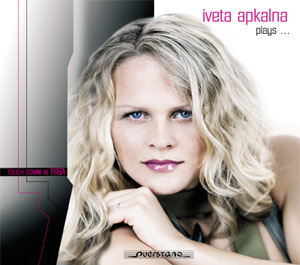 One of Latvia’s at present most acclaimed artists abroad, concert organist Iveta Apkalna has returned home to Riga after a four month concert tour leading her through festivals in Austria, Switzerland, Germany, Luxembourg and Finland. Having been one of the top festival highlights during the renowned Handelfestival in Halle/Saale (Germany) with thousands of listeners in her concerts there the Latvian Music Award winnner will now perform “at home” again on July 21st at 13.00 in the Saviour’s church and on July 23rd at 19.00 in St. John’s church, Riga.Iveta’s 2nd CD, “Touch down in Riga”, recorded last autumn in Riga Dom Cathedral, will be first time available in Latvia on the occasion of these concerts. The album was produced by the German label Querstand and officially released in Germany on June 11th following a TV profile about Iveta Apkalna shown in Germany’s most viewed cultural TV magazine “Titel, Thesen, Temperamente” which is produced and broadcast by the TV-channel “ARD”.Back to Germany in September, Iveta Apkalna will take part in the opening of the concert season of theKonzerthaus Dortmund on September 25th. The opening event will be a spectacular organ night including celebrity concert organists like Barbara Dennerlein and Simon Preston beside Latvia’s organ star.Lukas Pollack, Germany, One of Latvia’s at present most acclaimed artists abroad, concert organist Iveta Apkalna has returned home to Riga after a four month concert tour leading her through festivals in Austria, Switzerland, Germany, Luxembourg and Finland. Having been one of the top festival highlights during the renowned Handelfestival in Halle/Saale (Germany) with thousands of listeners in her concerts there the Latvian Music Award winnner will now perform “at home” again on July 21st at 13.00 in the Saviour’s church and on July 23rd at 19.00 in St. John’s church, Riga.Iveta’s 2nd CD, “Touch down in Riga”, recorded last autumn in Riga Dom Cathedral, will be first time available in Latvia on the occasion of these concerts. The album was produced by the German label Querstand and officially released in Germany on June 11th following a TV profile about Iveta Apkalna shown in Germany’s most viewed cultural TV magazine “Titel, Thesen, Temperamente” which is produced and broadcast by the TV-channel “ARD”.Back to Germany in September, Iveta Apkalna will take part in the opening of the concert season of theKonzerthaus Dortmund on September 25th. The opening event will be a spectacular organ night including celebrity concert organists like Barbara Dennerlein and Simon Preston beside Latvia’s organ star.Lukas Pollack, Germany,concert management and public relations Iveta Apkalna lpollack@gmx.net |
|
|
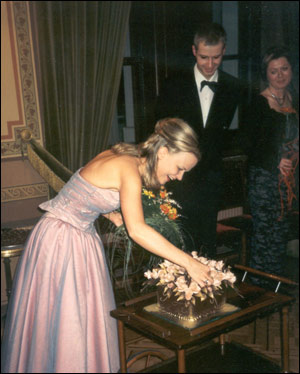 Iveta Apkalna, concert organist from Riga (Latvia), was the winner of the public award, installed in 2004 for the first time by the Latvian Ministery of Culture in connection with the Grand Latvian Music Award ceremony which is annually held in Riga Opera House since 1993. Internet users from all over the world were asked to vote online for their favourite among the eight award recipients this year (conductor, choir leader, composer, primaballerina, tenor, musicologist, chamber music ensemble, organist). Main sponsor of this public prize was Latvia’s most exclusive chocolate manufacturer Emil Gustavs who presented Iveta Apkalna a huge, artistic chocolate creation over and over decorated with marzipan roses weighing ca. 6 kg and having a value of roundabout 250 US$.Lukas Pollack, Germany, Iveta Apkalna, concert organist from Riga (Latvia), was the winner of the public award, installed in 2004 for the first time by the Latvian Ministery of Culture in connection with the Grand Latvian Music Award ceremony which is annually held in Riga Opera House since 1993. Internet users from all over the world were asked to vote online for their favourite among the eight award recipients this year (conductor, choir leader, composer, primaballerina, tenor, musicologist, chamber music ensemble, organist). Main sponsor of this public prize was Latvia’s most exclusive chocolate manufacturer Emil Gustavs who presented Iveta Apkalna a huge, artistic chocolate creation over and over decorated with marzipan roses weighing ca. 6 kg and having a value of roundabout 250 US$.Lukas Pollack, Germany,concert management and public relations Iveta Apkalna lpollack@gmx.net |
|
|
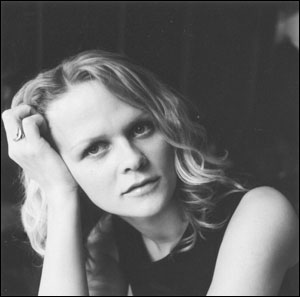 A Grand Latvian Music Award goes to the Latvian concert organist IVETA APKALNA due to special merits in the field of music.It is only for the second time in the long tradition of this prize (award holders a.o. Gidon Kremer, Mariss Jansons, Peteris Vasks, Baiba Skride, etc.) that the instrument organ is being considered in this awarding. Iveta will be honoured during the award ceremony held in Riga Opera House on March 5th 2004.Previously, in September 2003, Iveta was the winner of the 3rd International Mikael Tariverdiev Organ Competition in Kaliningrad (patron Vladimir Putin) placed by the Russian media on one stage with the prestigious Tchaikovski-competitions in Moscow.Moreover, Iveta is Bach-prize holder of the “Royal Bank Calgary International Organ Competition” (musical director Simon Preston) and winner of its European selection round held in St. John’s, London, 2002. A Grand Latvian Music Award goes to the Latvian concert organist IVETA APKALNA due to special merits in the field of music.It is only for the second time in the long tradition of this prize (award holders a.o. Gidon Kremer, Mariss Jansons, Peteris Vasks, Baiba Skride, etc.) that the instrument organ is being considered in this awarding. Iveta will be honoured during the award ceremony held in Riga Opera House on March 5th 2004.Previously, in September 2003, Iveta was the winner of the 3rd International Mikael Tariverdiev Organ Competition in Kaliningrad (patron Vladimir Putin) placed by the Russian media on one stage with the prestigious Tchaikovski-competitions in Moscow.Moreover, Iveta is Bach-prize holder of the “Royal Bank Calgary International Organ Competition” (musical director Simon Preston) and winner of its European selection round held in St. John’s, London, 2002.
Iveta’s first CD was issued in September 2003 by the German label Edition HERA, a live-recording from a concert in the “Stuttgarter Johanneskirche” (Germany) with works of Liszt, Vasks, Bach, Hakim and Glass. Her second CD will be released in May 2004 by the label “Querstand”, Germany, (Deutscher Schallplattenpreis 2003), recorded on the legendary Walcker-organ of Riga Dome Cathedral with works of Reger (2), Vasks and Hakim.
Lukas Pollack, Germany, |
The First Israeli Organ Festival will take place simultaneously in Tel-Aviv, Haifa and Jerusalem between the 17th and the 20th of November 2003.
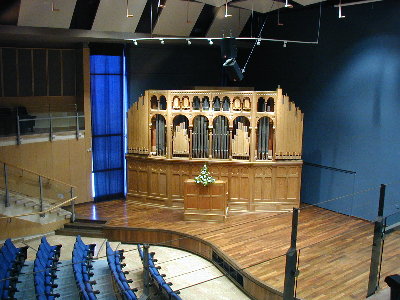 The First Israeli Organ Festival is organised by the
The First Israeli Organ Festival is organised by the
Israel Organ Society.
22 Itshar Street,
Jerusalem, Israel
In Tel-Aviv the Festival will be held at the Clairmont Recital Hall in the Tel-Aviv University campus. The 39 stops, three keyboard organ was built in 2002 by the German organ builder Hermann Eule.
In Haifa: in the Hecht Museum Auditorium of the Haifa University. The organ was built in 1998 by the Israeli organ-builder, Gideon Shamir. It has 32 stops, and two keyboards.
In Jerusalem: at the Brigham Young University Center for Middle-Eastern Studies on Mount Scopus. The organ is 1983 Marcussen with three keyboards and 38 stops.
The program is composed of 18 two-hour-long organ concerts. It covers most of the classical repertoire and several modern pieces which will be heard in Israel for the first time.
The organists taking part of this event are:
Francois Espinasse, titular of Saint-Severin church in Paris
Vincent Warnier, titular of Saint-Etienne du Mont church in Paris
Sabin Levi, organ-player and composer, residing currently in the USA
Istvan Ella, well-knowned Hungarian organ player from Budapest
Elisabeth Roloff, German organist residing in Jerusalem
Roman Krasnovsky, organ-player and composer residing in Israel
Yuval Rabin, organ-player and composer residing currently in Switzerland.
More Information:
Sabin Levi, sabin*XNOSPAMX*mail.ku.edu (replace *XNOSPAM* with @ to send mail)
The Israeli Organists’ and Organ lovers’ Club
The Brighton Dome organ returns to the Concert Hall Sunday 28th September, 2.45pm.
BRIGHTON DOME
Dome Concert Hall
Corn Exchange
Pavilion TheatreThe Brighton Philharmonic Orchestra opens its 79th concert season with a spectacular concert, which includes the chance to hear Brighton Dome’s famous pipe organ for the first time since its reconstruction. Michael Maine will performSaint-Saëns‘ fabulous Organ Symphony, which provides a fantastic showcase for the instrument, with the BPO conducted by Principal Conductor Barry Wordsworth. Coincidentally the last organ performance by the Brighton Philharmonic was the same Saint-Saëns work performed by Stephen Hicks on 27th March 1994.
The Brighton Dome are also programming several dedicated organ concerts for the Spring/Summer season (2004) with such luminaries as Thomas Trotter, Carlos Curley and Wayne Marshall. Whilst next year’s Brighton Festival programme will feature one or two orchestral pieces which make full use of the organ’s fantastic versatility.Brighton Dome was built in l803 as the stables adjoining the Prince Regent’s (George IV) oriental extravaganza, The Royal Pavilion. In 1850 the Dome was converted into a Concert Hall which included a 4 manual Father Willis organ, which when the building was re-designed in l935 was taken out. When the l930s art deco interior was introduced the present Norman, Hill & Beard dual-purpose concert organ was installed in l936, it was tailor-made to suit the many uses of the Concert Hall during that period and therefore built to be played as either a cinema or classical organ. It was designed by Dr Stanley Roper (Organist of HM Chapel Royal, London), Quentin MacLean (famous cinema organist of the Trocadero, Elephant and Castle), and Brighton Borough Organist at the time, Dr Alfred Abdey.
The instrument became famous through the many broadcasts of Douglas Reeve in the heyday of the BBC Light Programme’s 10am theatre organ programmes. His twice-weekly summer series of Pack up Your Troubles organ concerts attracted capacity audiences. He also inaugurated, just after the 2nd World War, the weekly Tuesday Night at the Dome variety shows, which made the Guinness Book of Records as the longest running seaside variety show in the world (1600)!
Brighton Dome’s Concert Hall re-opened in March 2002 after three years of extensive restoration and re-building after years of neglect. The job of restoring the organ was given to David Wells (Organ Builders) of Liverpool, who are one of the best of only 10 organ builders in the country. Although the Concert Hall re-opened over a year ago, it has taken far longer to install the organ, largely due to the fact that it is now a working venue and the organ needs to be installed in a dust-free environment. Although the chambers were installed some time ago, the final components will finally be put in place in August when the venue closes for routine maintenance.
The wonderful acoustics of the Concert Hall’s new Carmen system means that the organ will be heard in prime condition.
All press enquiries: Caroll Pinkham, Press Officer, Brighton Dome 01273 260 826 or email:caroll.pinkham@brighton-dome.org.uk
Brighton Dome official website
Organ of Brighton Dome
 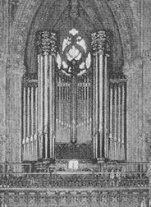 Thomas Murray & E.M. Skinner,
Opus 524 (1925, V/80)
A Concert to Celebrate
Stage I Restoration of an
American Masterpiece –
The Solo Stops Speak Again!
Come join us!
Sunday, September 28, 2003 – 8:00 pm
Suggested Donation $15.00, Students/Seniors $10.00
157 Montague Street (Corner of Clinton St.)
Brooklyn Heights, NY 11201
(718) 875-6960
|